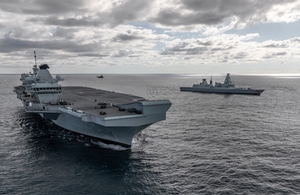
Critical radars that protect the Royal Navy’s fleet of warships against hostile airborne and seaborne attacks will be upgraded and maintained under a deal worth £270 million.
The 10-year contract, which has been awarded to BAE Systems to run until 2032, will support Artisan, Sampson and Long-Range Radars which are found on warships including Type 23 and Type 26 frigates, Type 45 destroyers, and the Queen Elizabeth Class Aircraft Carriers.
As well as securing 400 highly skilled jobs in Cowes, Portsmouth, Essex and in Hillend near Edinburgh, the contract, which includes upgrading existing radars as well as maintenance and other in-service support, ensures the UK retains the highly-specialist skills required for a sovereign option in future radar development.
Minister for Defence Procurement, James Cartlidge said:
Equipping our Armed Forces with the latest technology to counter emerging threats is critical to ensuring the safety and effectiveness of our fleet and personnel.
Securing hundreds of jobs across the country, this contract is a boost for the UK Supply Chain and lets our adversaries know we are equipped, prepared and ready.
Supporting the Prime Minister’s priority to grow the economy this contract secures hundreds of jobs and provides a boost to the wider UK supply chain by allowing BAE Systems to create new support roles in engineering and project management including further investment in the UK supply chain of SME and high-tech suppliers.
Cdre Steve McCarthy, Director Ships Support at DE&S, said:
This is an excellent outcome for Defence and our industry partners, supporting vital highly skilled UK jobs to underwrite the future of state-of-the-art British naval radar technology. These systems give the Royal Navy the battle-winning edge it needs to protect and defend our nation.
The radars provide a key defensive capability to the Royal Navy at sea and are used to identify and track potential airborne and seaborne threats.
Rear Admiral James Parkin CBE, Director Develop at Navy HQ said:
By combining the support of our existing maritime complex radars, the Royal Navy will be better able to adapt to technological change and our ships will be able to respond faster to developing operational threats. This system of systems approach being taken by BAE Systems aligns with our own approach to sensor development and will maintain our status as one of the world’s leading maritime forces.
Scott Jamieson, Managing Director of BAE Systems’ Maritime Services business, said:
This is a pivotal moment for UK radar technology development. This contract secures a decade of investment into a critical capability for the UK armed forces. It also allows us to evolve future radar technology with the MOD to sustain maritime air dominance and vital radar development skills and experience in the UK.



































